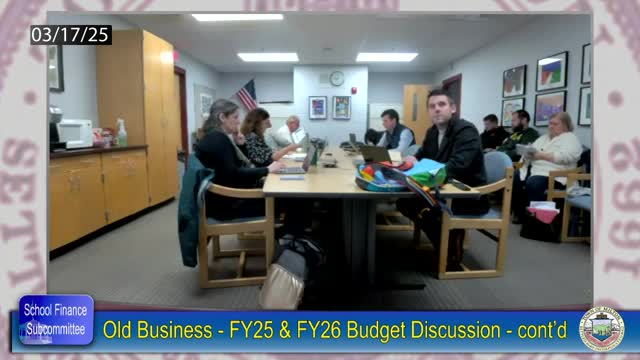Milton leaders agree to create special education stabilization fund as schools and town debate $700,000 treatment in FY26 override
Get AI-powered insights, summaries, and transcripts
Subscribe
Summary
Milton School Committee members and town officials met to clarify how a $700,000 special-education circuit-breaker replenishment was treated in the town's FY26 override package and to decide short-term steps to cover a FY25 operating shortfall.
Milton School Committee members and town officials met to clarify how a $700,000 special-education circuit-breaker replenishment was treated in the townoverride package and to decide short-term steps to cover a FY25 operating shortfall.
Joanne McCarthy, town staff member, and Amy Dexter, town staff member, told the committee that the select board had voted a $9,500,000 overall level-of-service number for the override, with the schoolsallocation at 5.7 rather than 6.4. Amy Dexter said the town—sideviewed the $700,000 as part of an operating stabilization approach rather than as a permanent addition to the school operating base: "we didn't think it was appropriate to include it in the override," Dexter said, describing the town's preference to treat that funding as a replenishment or one-time/stabilization resource rather than a recurring levy increase.
The nut graf: The distinction matters because Milton Public Schools say the $700,000 was intended to replenish a circuit-breaker reserve used in FY24 to cover unanticipated special-education costs; removing that replenishment from the FY26 operating request would force the district either to reallocate operating dollars or cut services. Town officials countered that moving funds into a town-level stabilization mechanism helps keep the override request at a level the select board believes is sustainable over several years.
In the discussion, school staff described recent and continuing cost pressures in special education that drive the shortfall. A district presenter said transportation and contracted services lines had risen by nearly $300,000 since the FY26 budget was drafted, and gave an example that the transportation budget appropriated at $1,800,000 this year was projected to reach $3,100,000 in actual spending. The speaker said the district expects to need roughly $2,725,000 in circuit-breaker funding next year to avoid cuts if expenses remain at current levels.
Town representatives explained the local budgeting approach: by reallocating $700,000 into an operating stabilization fund and proposing a $1,000,000 special education stabilization fund (to be established by an article at annual town meeting), the town aims to stretch the effects of the override across three to five years and reduce the chance of another immediate override request. Town staff said the $700,000 figure was in part mathematical ("coincidental, but really just math") to align the total package with the $9.5 million target.
School committee members emphasized the difference in perspectives. Committee member Amanda (full name not specified in the transcript), and other members pressed the district and town staff to clarify what a removal of the $700,000 from the school operating line would mean in practice: whether the district would be expected to draw the same amount from the new stabilization fund, use circuit-breaker reimbursement, reallocate other operating lines, or seek additional appropriations. District leaders replied that the stabilization fund is one tool but that known recurring increases in special-education costs should be in the operating budget rather than covered repeatedly with one-time funds.
The committee and town staff also discussed immediate FY25 options to close a year-end deficit. The district presented a set of potential offsets and asked capital and finance committees to consider rescinding two capital requests so those capital dollars could be reallocated to FY25 operating needs: $391,000 for Chromebook purchases and $75,000 for rooftop unit upgrades. The committee voted to ask the town to rescind those capital requests and reallocate the funds to the FY25 operating budget.
Formal actions taken at the meeting included a vote to request establishment of a Special Education Stabilization Fund and votes to request reallocation of the two capital items to the FY25 operating budget. Committee members also discussed personnel actions (a hiring freeze and possible HR/operations position reductions) as potential but undesired ways to close the FY25 gap.
The meeting concluded with a plan for the schools to return with revised FY26 budget scenarios and more detailed impact information (including the effect of potential HR position reductions) at follow-up meetings before the select board's final decisions and the town's annual meeting. Town staff said if the committee seeks appropriation of free cash for FY25 it will require a warrant article at Town Meeting.
